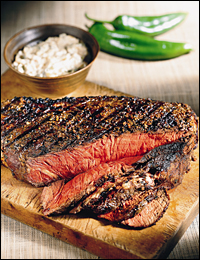My dear bass bloggers... I find myself once again falling back into my old obsession of relentless practice. I posted a little thing on what to practice when you don't have time to practice everything you want.
Do you guys have any opinions on the subject that you would care to post? Know anyone else that might have good advice or experience to share?
 There's a great phrase they use in Argentinian music, a la parilla. It means "lightly grilled," sometimes vuelta y vuelta ("on each side"). The music needs to be prepared just well enough - medium rare, let's say - so that it still has the juice of spontaneity in it, without being too gamy or viral!
There's a great phrase they use in Argentinian music, a la parilla. It means "lightly grilled," sometimes vuelta y vuelta ("on each side"). The music needs to be prepared just well enough - medium rare, let's say - so that it still has the juice of spontaneity in it, without being too gamy or viral!I'm no expert chef, but when it comes to practicing I think we tend to burn the crap out of things, especially when we're young and still figuring things out. Joe mentions practicing up to 12 hours a day - in a response post, Jason Heath confesses to 9 hour practice days. Both from a physiological and a musical standpoint, that kind of practice routine doesn't make any sense. Playing the bass is a taxing activity, both mentally and physically - we need time to recover and process what we've learned, before slamming it through our neurons 50 more times.
Overly repetitive, uninterrupted practice is what leads to overuse, tendinitis, as well as neurological problems like focal dystonia. It also may reduce your ability to have any sort of life outside of the practice room. Which means limiting yourself as a musician, as well as a human being.
Don't do it, and if you feel a need to practice that much, follow Joe's advice and take plenty of breaks! Preferably including some sort of social interaction...
Now that I got that rant out of the way, I haven't really answered Joe's question, which is how to practice less, and still get things done. A few guidelines I would suggest:
- Have a plan. Before you get into the practice room, take a moment to think over what needs the most work - and if that is one particular piece or excerpt, what specifically is causing problems? Try and isolate one concept you can work on. That way, even as you do your warm-up exercises, you can tailor them to that particular problem.
- Have a quick warm-up. Find some exercises that get your hands working quickly - Joe and I both studied with Don Palma, who has several terrific examples. These can be modified with different bowings, tempos, articulations - again, to complement the work you're focusing on.
- Don't get sidetracked or nitpicky. If your focus is the intonation at rhl. C, don't start obsessing about the legato 12 before! Keep your focus on the issue at hand, and make a note to work on that legato next time you have the opportunity.
- No need to run the whole piece. Once we've taken things apart, we all want to put things back together again. If you have enough time to do this, it might give you a certain degree of personal satisfaction. But it's also likely to bring up more problems or ingrain bad habits.
- Write things down. Make it part of your practice to note what you focused on, how it worked, and your goals for next time. This will help you get back into the practice mindset quicker in the next session.
I can't say I follow all these guidelines as much as I'd like - when I have plenty of practice time, it's easy to get self-indulgent and not really accomplish that much. At the end, I realize I could have done more in two hours of focused work than I did in four. That being said, I'm going to start a new practice journal - maybe sharing some of it here, if people are interested - and see if I can't make my practice a bit more a la parilla.


 Technorati Link Count: no. of blog reactions to this post
Technorati Link Count: no. of blog reactions to this post
3 comments:
Great practicing tips, Matt. I must say, my nine hour practice days are long behind me. I used to try (on a consistent basis) to get in around 2-3 hours of alone time on the double bass daily. This sounds like what a lot of professionals do. I know that you used to be incredibly consistent in terms of practice routine, timing, etc. Is that still the case?
Excellent writeup. And that steak looks delicious!
Great tips! It made very good reading during my practice break :)
Please keep the advice coming. It certainly appreciated and very helpful.
Eric
Post a Comment